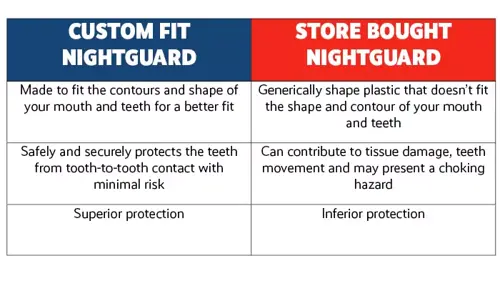Bruxism & TMJ
- Home
- /
- Services
- /
- Preventative Dentistry
- /
- Bruxism

Teeth grinding, also known as Bruxism, is the unconscious grinding or clenching of the teeth or jaw that is not part of normal chewing movements. The condition can be related to stress and other lifestyle factors such as some medications. The condition can affect people during the day but is more common during sleep.
Bruxism can lead to teeth becoming worn and, if left untreated for too long, can cause strain and pain to our teeth and jaw joints such as the temporomandibular joint (TMJ). Over time this can result in TMJD (Temporomandibular Joint Disorder), a painful condition in the jaw.
Ask yourself these questions
- Do you have a headache combined with jaw joint and/or ear pain?
- Do you have aching teeth, especially after waking up?
- Do you have aching and/or stiffness of the face and temples?
- Do you have aching and/or stiffness of the jaw while chewing or eating?
- Do you clench your jaw when anxious or concentrating?
- Are your teeth temperature-sensitive? (Cold foods such as ice cream or hot drinks such as coffee)
- Do you suffer from cracked or chipped tooth enamel or repeated broken fillings?
If you have answered yes to any of the above symptoms, you may be suffering from Bruxism or Temporomandibular Joint Disorder especially for those who experience teeth grinding or jaw clenching during sleep.
What problems are caused by teeth grinding or bruxism?
Bruxism can lead to long-term damage to teeth and jaw joints as a side effect of constant overuse of the teeth and jaw muscles. Problems caused by teeth grinding may include cracked tooth enamel, increased wear and tear on teeth, broken teeth or fillings, pain in the jaw joint including limited movement.
Over time, excessive grinding or clenching of teeth can also result in the loss of tooth structure or tissue caused by tooth-on-tooth contact. This is also known as dental attrition.

Excessive teeth grinding and clenching can also result in teeth moving out of their proper position resulting in a misaligned bite.
What is TMJ disorder?
The temporomandibular joints (TMJ) are the two joints at the sides of your jaw that allow your jaw to move. They are responsible for allowing normal mouth movements when we talk, yawn and chew. The joints are located on each side of the head at the base of the skull and connects the lower jaw to the skull.
If you experience pain and stiffness in your TMJ, you may have a TMJ Disorder (TMJD). The exact cause behind TMJD is not yet fully understood, but it affects many adults and is often related to excessive jaw clenching or teeth grinding (bruxism).

A TMJ Disorder (also known as TMJD) may result in symptoms such as jaw pain, abnormal jaw movement and sometimes a clicking or popping noise during normal jaw movement. Pain with your TMJ can cause jaw pain that may radiate to the neck, face, and head.
Treatments
If you are suffering from teeth grinding, clenching or jaw pain you don’t need to put up with it. It’s better to seek treatment early on to avoid long term damage. While there is no one cure for Bruxism and TMJD, several effective treatment options are available at a participating clinic.
- Nightguards (splints)
Nightguards, also known as ‘Splints’ or ‘Night Mouthguards’, are worn during sleep to help limit overnight grinding and clenching of the teeth and jaw. Nightguards work by placing a barrier between the teeth on the upper and lower jaw to cover the teeth helping to shield the teeth and jaw for potential damage from teeth clenching and grinding during sleep.
- Difference between custom-fit nightguards vs off-the-shelf nightguards
Online or over the counter nightguards are typically cheaper than a nightguard fitted by a dentist but they are not made to fit your teeth perfectly. It’s important to consider the significant benefits of a custom fit nightguard before making a purchase.
Only a custom fitted nightguard (fitted by a dentist) offers a superior level of protection for your mouth.

Make the first step by booking your appointment today
If you suffer from teeth or jaw clenching, pain or stiffness you should book your TMJ/Bruxism consultation at a participating clinic* today.
Book online or call a participating clinic today: Toowoomba, Carindale, Cammeray, Rockhampton, Buderim, and Morayfield.
Sources:
- https://www.betterhealth.vic.gov.au/health/conditionsandtreatments/teeth-grinding
- https://www.colgate.com/en-us/oral-health/bruxism/over-the-counter-vs-custom-night-guard-which-is-right-for-you
- https://www.sleepfoundation.org/best-mouthguard-for-teeth-grinding
- https://www.proteethguard.com/blog/how-does-a-night-guard-work/